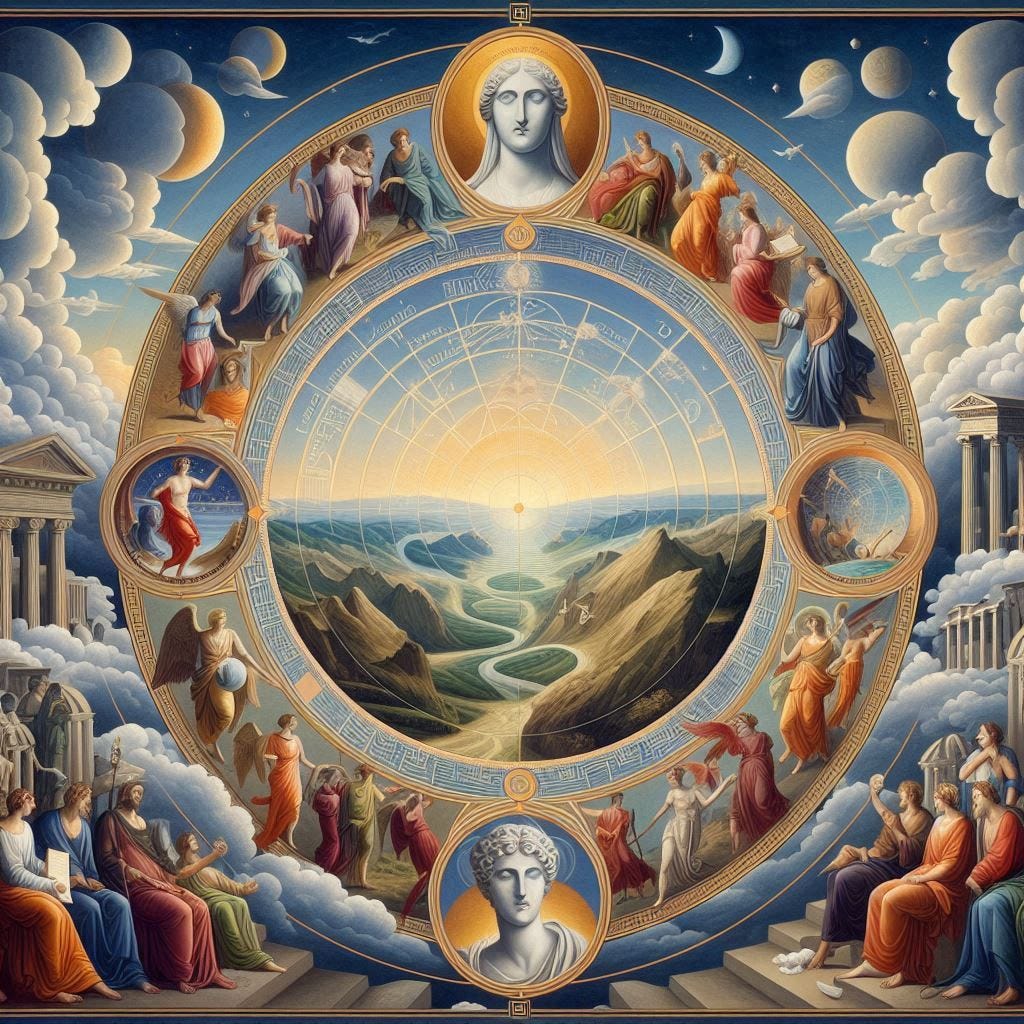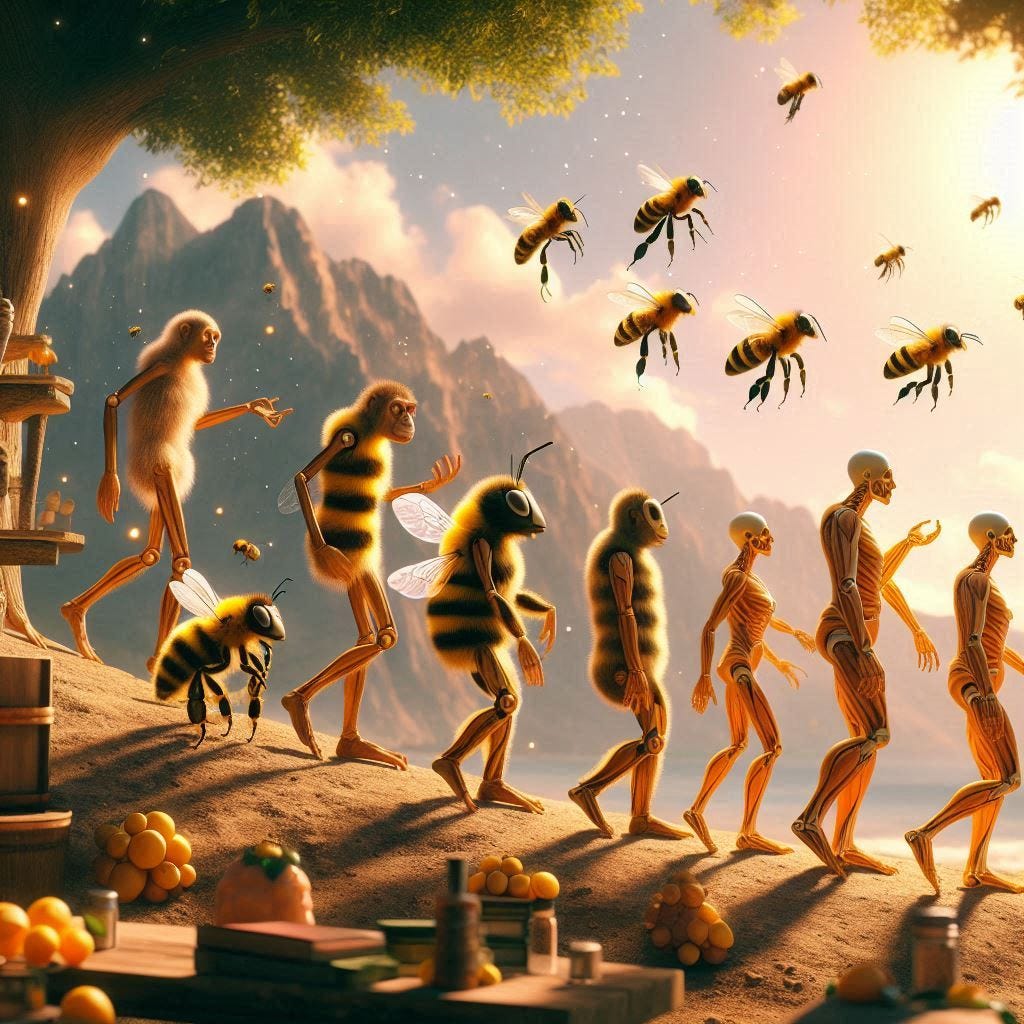An argument from ethical harmony for theism
"Ethics is the activity of man directed to secure the inner perfection of his own personality." — Albert Schweitzer
Harmony arguments have become the new cool kids in PoR departments since Cutter and Crummett introduced their argument from psychophysical harmony1, (and its sister nomological harmony2) for theism. Some even consider it the *best* argument for theism. I digress. As an amateur philosophy enthusiast, I find these arguments fascinating. On the other hand, I don’t like moral arguments for God’s existence, and I don’t find many of them plausible. Here's my attempt at constructing a semi-novel moral argument that uses harmony to advocate for theism.
Ethical harmony is predicted on theism over bare naturalism.
Broadly, ethical harmony is true.
The existence of ethical harmony makes theism highly probable.
This is a very bare-bones description of the style of argument I’m going for.
So, what is ethical harmony?
Ethical harmony, as I understand it, primarily consists of two aspects. It is the alignment between our moral inclinations and our actions in the world, as well as the congruent relationship among our moral inclinations themselves.
The argument is easier to understand if one assumes moral realism to be true.
The key insight to harmony to me, comes from Kant. Kant argues for something called the categorical imperative - “Act only according to that maxim whereby you can at the same time will that it should become a universal law.”3
To grasp this concept, let's consider Kant's perspective on lying. He asks if it makes sense for us to will that everyone lied all the time. If everyone lied, no one would trust anyone, making it impossible to function as a society, and in such a world, it doesn’t make sense for you to lie, because you wouldn’t have any advantage. This leads to a contradiction; it undermines the essence of truth. Therefore, Kant concludes that always telling the truth is a categorical imperative.
However, this does not say anything as to whether universalized laws are harmonious with our practical reason. Kant himself argues something similar. Since we would only tell the truth, if it is generally good for everyone to tell the truth, there is a certain teleology implicit in our moral actions. Of course, we have no idea if it does or what such a purpose would be. However, if we were to speculate about what kind of final purpose the universe might have, we only have one idea within our reason that could serve as a final purpose of the universe: the idea of the highest good. For Kant, the highest good occurs when natural and moral laws converge, guiding our motivations and situations toward virtuous conduct, and thereby enhancing our material happiness. Simply put: it's the belief that if we act morally, things will get better. The highest good, or the summum bonnum, for Kant, is God.
If we did not implicitly believe in a harmony between our desires, moral law, and the natural world, we would lack practical reasons to act ethically. Consider honesty; why would we tell the truth if it always led to our suffering? Without this harmony, we'd face a prisoner's dilemma, where lying seems advantageous if we expect others to lie, placing truth-tellers at a disadvantage.
Note that I am not suggesting ethical actions are good merely because they serve one's self-interest. Morality could be inherently "good," and we should pursue the good even when it may not benefit us personally. Broadly speaking, we can practically pursue the good because our reasoning assumes such harmony. The beauty we find in doing good motivates us to act rightly.
The alignment of moral truths with our ethical decisions appears quite astonishing within naturalism. Assuming a fundamental indifference in the fabric of reality, it becomes challenging to predict why acting virtuously should hold more value than not. If nature is essentially apathetic towards our desires, the motivation to act rightly becomes questionable.
Moreover, there's an intrinsic coherence in our moral inclinations. We perceive virtue as inherently valuable, enhancing our character with each good deed, thus making eudaimonia a tangible objective. 4Virtue induces a state akin to zen. Yet, it's conceivable that virtuous acts don't necessarily refine our character or align with our desires. Good deeds could, in theory, degrade us and make us absolute stinkers. Imagine if we were psychopaths who found zen in committing atrocities! Thankfully, we are not. We infer that a psychopath's sense of zen stems from distorted moral desires.
Considering ethical harmony, it becomes apparent that naturalism fails to adequately explain the implicit harmonious relationships inherent in our ethical behaviors. As a philosophy that is neutral towards values, naturalism does not predict the emergence of sentiet moral beings or a moral order. It remains apathetic to our desires because it does not contain goodness as a fundamental value.
Theism posits the existence of a morally perfect being, namely God. According to theism, God, being perfect, would naturally desire good things. Consequently, the existence of moral sentient beings is predicted under theism. Furthermore, as Swinburne suggests, God would create us as embodied beings enriched with desires and free will, capable of interacting with the world and morally shaping our lives.5 In such a universe, God would embed a moral framework, making the pursuit of good both rational and practical. Engaging in good deeds would lead to happiness. Additionally, certain theistic views hold that performing good deeds predisposes us to continue doing good, ultimately culminating in a eudemonic 'heaven'.
Theism offers a more convincing explanation for ethical harmony compared to naturalism. From a Bayesian perspective, the likelihood of ethical harmony is higher under theism. Provided that theism's prior probability is not extremely low, the observed ethical harmony supports the existence of an ethical designer, one who desires and embodies the Good – essentially, God.
The relative merits of this argument, in my view, is that it doesn't require to assert that morality is dependent on the existence of God. A non-theistic account of morality could still be valid and yet call out for harmony. I think one could run this argument without holding moral realism; all it needs is one’s ethical framework to include normativity and desires, making it compatible with constructivism and some forms of anti-realism. Even if there is no objective truth about the good, there remains a need to explain why our moral desires are harmonious with an inter-subjective moral framework and the world. The argument could also counter error theory and non-cognitivism, both of which are extremely unpopular in ethics today.6 It also works whether you’re a consequentialist or a deontologist; as long as your ethical system anticipates that your moral considerations map with the good. The only thing the argument needs to work is the existence of moral desires, some form of cognitivism, and the falsity of moral nihilism, all of which are highly plausible and very modest in ethics.
Possible responses and rejoinders:
1. Evolution accounts for ethical harmony
If, for instance, to take an extreme case, men were reared under precisely the same conditions as hive-bees, there can hardly be a doubt that our unmarried females would, like the workerbees, think it a sacred duty to kill their brothers, and mothers would strive to kill their fertile daughters; and no one would think of interfering. - Charles Darwin
I’m not sure evolution really helps us here. Evolution does not concern itself with the semantic content of our moral views; it only cares about survival. In many survival scenarios, it could be advantageous to act in ways we typically consider wrong. 7According to naturalism, all we would expect our behaviors to be linked to pleasure since they contribute to our survival. Therefore, claiming that what is "good" is evolutionarily advantageous assumes that goodness aids in our survival, which is the very issue we are discussing. If our specific moral desires had evolved differently, our moral judgments would also be different. This is evident in the animal kingdom, where behaviors such as rape and murder are prevalent. Additionally, as Crummet and Swenson have argued, moral knowledge becomes redundant under naturalism, presenting another significant harmony problem.8
Ethical harmony does not necessitate a God
In a certain sense, this seems accurate. Ethical harmony merely requires the truth of a value-selecting hypothesis. The argument is compatible with with theories such as karma, axiarchism, and non-theistic worldviews that have teleology. Even Judaism presents an analogous concept with chokmah, which is the moral framework of the universe created by God, the Logos. However, this argument renders bare naturalism — which assumes a principle of indifference — implausible. Perhaps theism might carry greater weight based on theoretical and intrinsic virtues, but I digress. This might be the strongest objection to the argument.
The problem of ethical disharmony
In a way, this pertains to the problem of evil. The Book of Ecclesiastes is a seminal text on the subject.
Ecclesiastes 8:14 - There is a vanity which occurs on earth, that there are just men to whom it happens according to the work of the wicked; again, there are wicked men to whom it happens according to the work of the righteous. I said that this also is vanity.
However, this does not move me as much. Although our desires may not always align with what is good, and sometimes doing the right thing can have undesirable consequences for us, it seems that most of our ethical considerations are indeed aligned with goodness. If they weren't, we would not be inclined to desire what is good in the first place. If God created a world that includes elements like the defeasibility of all evils, free will and soul-building, then this could explain the occasional disharmony in our ethical actions.
Ethical disharmony might even work as an argument for God in a sense. As Kant argued, morality requires us to strive for self-improvement and to will the good solely for its own sake. However, Kant also suggests that achieving this ideal within our mortal life is impossible. It would not be reasonable to demand such moral perfection from us if we live only one earthly existence. So, what is the solution to this apparent contradiction between morality's demands and our human limitations? Kant argues that reason must conceive of us as immortal beings rather than merely mortal. Since bodily death is evident, reason can only coherently conceptualize our immortality by postulating the existence of an immortal soul. If we continue to exist after death, it becomes clearer why our moral actions hold significance, even if their practical effects are not immediately apparent. Our mortal lives are just a small part of a larger narrative, which means that even if we do not see the results of our good actions in the present, it is still reasonable to consider their importance in the grand scheme of things.
1 Corinthians 13:12 - For now we see through a glass, darkly; but then face to face: now I know in part; but then shall I know even as also I am known.
The problem of God’s ethical harmony
The so-called revenge problem does not seem convincing to me. God, being a simple entity, is by definition Goodness. Consequently, God's desires and will are perfectly aligned with the good. By virtue of His omni-attributes, God always wills and desires goodness. This is much less forceful than the revenge problem for psychophysical harmony, as it is widely accepted that God's desires are perfect by definition.
So what do you think of the argument? My personal thoughts on it are reserved but I thing it does a lot of things better than the traditional moral argument for God’s existence. Would love to know your thoughts.
Fin.
Crummett, Dustin, and Brian Cutter. "Psychophysical Harmony: A New Argument for Theism." Oxford Studies in Philosophy of Religion (forthcoming)
Cutter, Brian, and Bradford Saad. "The Problem of Nomological Harmony." Noûs (forthcoming)
Kant, Immanuel. Critique of Pure Reason. Translated by Marcus Weigelt, Penguin Classics, 2003
Aristotle. Nicomachean Ethics. Translated by Robert C. Bartlett and Susan D. Collins, University of Chicago Press, 2011.
Swinburne, Richard. The Existence of God. 2nd ed., Clarendon Press, 2004.
Bourget, David, and David J. Chalmers. "Philosophers on Philosophy: The 2020 PhilPapers Survey." Philosophers' Imprint, vol. 23, no. 11, 2023.
Darwin, Charles. The Descent of Man, and Selection in Relation to Sex. John Murray, 1871, Chapter IV.
Crummett, Dustin, and Philip Swenson. "God and Moral Knowledge." In A New Theist Response to the New Atheists, edited by Kevin Vallier and Joshua Rasmussen, 33-46. New York: Routledge, 2019







It’s impressive that you uncovered this argument on your own. What you are describing here has typically been referred to as the Kantian moral argument, or the moral argument from practical reason. If you go on PhilPapers, you’ll find that the section dedicated to moral arguments for God is full of arguments in this stripe. The argument has usually been derived from Kant, but Henry Sedgwick brought it to academic attention (he was a sympathetic critic of the argument). Some modern arguments with similar ideas behind them are Layman’s moral argument and Goetz’s moral argument, both of which tackle the disconnect between the demands of morality and one’s own wellbeing. If this argument interests you, then you may also be interested in John Hare’s Moral Gap argument. Finally, you may want to check out Clement Dore’s analysis of moral wrongdoing being intrinsically harmful as further proof of this harmony theory.